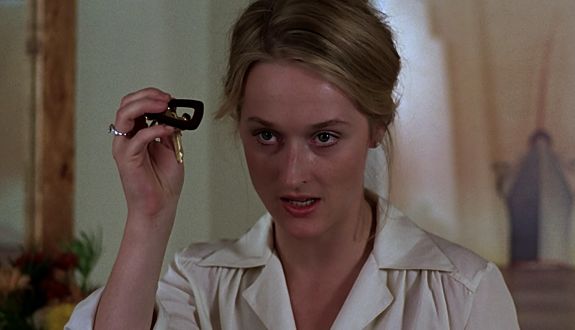The Greatest Lawyer Movies of All Time: Kramer vs. Kramer
- by
- Feb 14, 2017
- Entertainment, Legal Movies
- Reviewed by: Matt Riley


Joanne Kramer played by Meryl Streep. Overrated. BIGLY overrated. Sad!
The search for the greatest lawyer movie of all time is almost over. Of the ABA’s Top 25, only six remain, and one of those is “Chicago,” which I feel pretty okay about skipping. This week, I watched #16…
Kramer vs. Kramer
1979 dir. Robert Benton
Most lawyer movies go where the glory is: criminal jury trials with life or death stakes, multi-million dollar class action suits that change the world, etc. But the legal field is wide and varied, and there are plenty of areas of practice that are less glamorous but still full of dramatic potential.
“Kramer vs. Kramer” is perhaps the definitive movie about family law. It is the story of a marriage falling apart, a dad rising to the occasion, and parents getting embroiled in ugly custody battle.
Ted Kramer (Dustin Hoffman) is a workaholic ad executive in New York City. His wife Joanne (Meryl Streep) has put her own career ambitions on hold to raise their six-year-old son Billy, and though she’s a loving mother, she’s become deeply unhappy. One night, doing her best to contain her emotion, she tells Ted she has to go away and hands over to him a world of parental responsibilities with which he has only a passing familiarity.
Ted and Billy get off to a rocky start. Dad can’t cook, or show up on time, or control his temper. But he loves his son, and the work of raising him starts to make Ted a better man. He leans way the heck in, turning himself into a doting parent while holding down his high-powered white-collar job.
But Joanne hasn’t entirely left the picture. She watches father and son from afar, ghostlike. But it’s she who’s haunted. After finding herself in California, she realized how important it was for her to be with her son. She doesn’t mean Ted any harm, but she wants Billy back.
Reluctantly, the Kramers lawyer up. It’s interest that the adjective most often used to describe such legal proceedings is “ugly.” But in the hands of director Robert Benton, working from Avery Corman’s novel, the case isn’t so much ugly as sad. Both Kramers are good parents. Both love their child and wish each other well. But the logic of the case sucks them in. After a harsh cross-examination of Joanne, Ted tries to tell his lawyer to take it easy. “Do you want to keep your kid or don’t you?” the lawyer answers – and that about sums it up.
Looking at the film strictly from the lawyer movie angle, I really enjoyed “Kramer vs. Kramer.” It captures how strange and painful it is to have matters of the heart turned over to heartless attorneys. But it doesn’t demonize those attorneys, per se. They’re just representing their client’s wishes. After the trial, there’s a beautiful shot in which Ted and his lawyer walk slowly out of the courtroom, down a flight of stairs, wordlessly shake hands, and part ways. This is a grisly business, there’s no joy in it, but what else can be done? Maybe “ugly” is the right word after all.
“Kramer vs. Kramer” is great in quiet moments like that one. Ultimately, it aims to be a celebration of parenthood and of the big moments of every day life. At times, it lets these moments play out in real time and becomes almost unbearably real. Other times, the seams show and “Kramer vs. Kramer” verges into melodrama. It’s pretty unapologetic in its effort to jerk out tears, but the tears aren’t entirely unearned.
The biggest problem with the movie has to do with gender. Obviously, since it was made in 1979, it’s a little unfair to judge the movie’s politics by today’s standards. But to the modern viewer, “Kramer vs. Kramer” is uncomfortably anti-feminist. It is a story about parenting, told through a completely male lens, and it has little sense of irony about that. Joanne’s capriciousness as a parent is linked to her women’s-lib politics, and is even partly blamed on her friendship with a female neighbor. The court’s default position of awarding custody to the mother is treated as reverse sexism, and Ted is celebrated as hero for doing what millions of women do thanklessly every day.
I suppose it’s a sign of progress that the politics of so many movies on the ABA Top 25 have aged poorly. But if you can set aside those gripes, “Kramer vs. Kramer” is a worthwhile watch.
It might give you second thoughts about going into child custody law, though.
Search the Blog

Free LSAT Practice Account
Sign up for a free Blueprint LSAT account and get access to a free trial of the Self-Paced Course and a free practice LSAT with a detailed score report, mind-blowing analytics, and explanatory videos.
Learn More
Popular Posts
-
logic games Game Over: LSAC Says Farewell to Logic Games
-
General LSAT Advice How to Get a 180 on the LSAT
-
Entertainment Revisiting Elle's LSAT Journey from Legally Blonde








